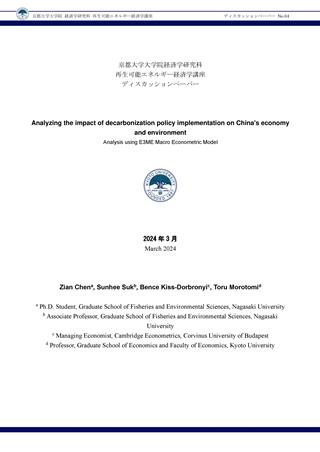TOP > ディスカッションペーパー > No.64 Analyzing the impact of decarbonization policy implementation on China's economy and environment: Analysis using E3ME Macro Econometric Model
No.64 Analyzing the impact of decarbonization policy implementation on China's economy and environment: Analysis using E3ME Macro Econometric Model
March 2024
Zian Chen(a), Sunhee Suk(b), Bence Kiss-Dorbronyi(c), Toru Morotomi(d)
(a) Ph.D. Student, Graduate School of Fisheries and Environmental Sciences, Nagasaki University
(b) Associate Professor, Graduate School of Fisheries and Environmental Sciences, Nagasaki University
(c) Managing Economist, Cambridge Econometrics, Corvinus University of Budapest
(d) Professor, Graduate School of Economics and Faculty of Economics, Kyoto University

As the world's largest emitter of greenhouse gas (GHG), China must implement robust strategies to address the increasing severity of climate change and meet its pledged emission reduction targets. This study uses the E3ME model to simulate the medium to long-term impacts of decarbonization policies, as represented by phasing out coal-fired power generation and the use of carbon pricing, on China's environment and economy. The results indicate that compared with the option of implementing solely regulatory policies (phasing out coal-fired power), the implementation of economic incentives leads to a shift in China's power mix to a much cleaner mode, thus making a greater contribution to CO2 emission reduction while also having a more significant positive impact on the economy. Moreover, among the three policy scenarios set out in this study, a national carbon market that adopts 100% free allocations and covers all sectors is the mitigation measure with the highest double-dividend effect for China. Therefore, China should focus more on developing and improving its national carbon market, expanding its scale, and achieving full sectoral coverage as soon as possible to facilitate the transition to a low-carbon economy and achieve its pledged emission reduction targets.
Keywords:phasing out coal-fired power generation, carbon pricing, carbon neutrality, E3ME model, power mix, economic impact

